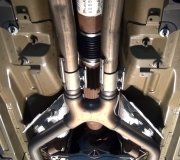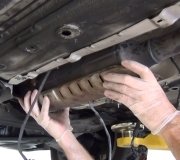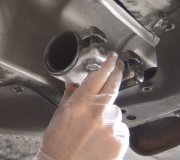As Joe said the color of the smoke is a clue. Because this is a turbocharged engine I'll hazard a guess and say the smoke is blue and clears up rather quickly. If so there are likely a couple issues involved.
The first item is that the 1.8 engine has a known oil sludge issue unless you change the oil at low mileage intervals, 3000 miles or less and use a full synthetic oil. The sludge can block the oil drain back holes in the head. That allows it to pool up and get drawn past the valve stem seals. These are around the valve stems and are normally able to keep 99% of the oil from getting past if there are no other problems. With the partly blocked drains there is a lot of extra oil and they are already worn some by the mileage on them. So the oil gets drawn in and burns.
Next is that this car has a turbo on it. Those are fed oil under pressure to keep the bearings in it from seizing. Those seals will also wear and it can push oil into the turbocharger itself. That will be drawn into the intake or the exhaust depending on which seal is the problem. That oil burns and creates smoke.
Last is the VW PCV system. Some are very problematic in operation. It collects the un-burnt fuel and gasses inside the engine and routes them to the intake to be burned off. If the engine has much wear the oil mist and crankcase gases can somewhat overmatch the system and it burns that all off.
All of these would clear up reasonably quick as the engine or exhaust temperatures rise. The sludge will soften and let more oil drain out, the turbo seals will heat up and they will leak less and likely go unnoticed if they are not leaking a lot. The PCV system would act like a straw, one it's all sucked out it takes a while for it to build back up.
Any of the three or a combination could be the cause.
Sunday, April 21st, 2019 AT 5:01 AM



